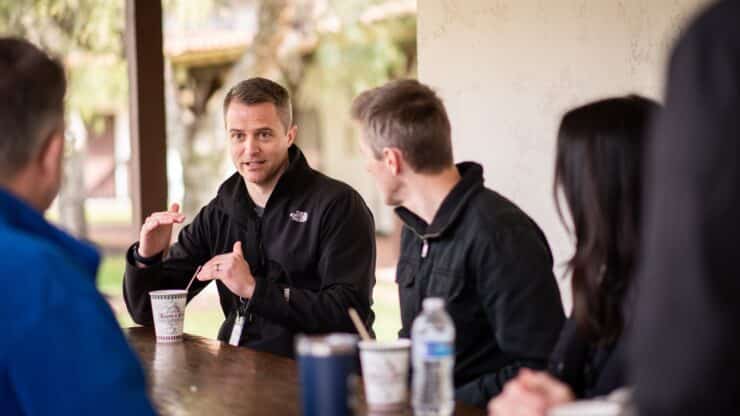How to Use Scripture in Disciple Making

Our 2023 National Disciple Making Forum will focus on the use of scripture in discipling relationships (click here for more).
Thank you for reading this post—it is significant because it will help you to see why this topic is so very important for all of us.
We make disciples by helping people to know and obey the teachings of Jesus in everyday life. (Matthew 28:19-20) Disciple making is practical. We help people to follow Jesus in their work, in their friendships, in their marriages, etc.
A good definition of a disciple helps us to see the holistic life transformation involved. The best definition that I have found is to use Matthew 4:19 as an outline.
And He said to them, “Follow me, and I will make you fishers of men.” (ESV)
We divide this verse so that it becomes a framework for the three key parts we find in the rest of the New Testament on what it means to be a disciple. These three parts include:
(1) “following” Jesus (head)
(2) “being changed” by Jesus through the Holy Spirit (heart)
(3) “committed to the mission of Jesus” “fishers of men” (hands)
Based on these three parts, we recommend the following definition of a disciple:
A disciple is one who is following Jesus, being changed by Jesus and is committed to the mission of Jesus.
For more, read What Do We Mean by “Disciple,” “Disciple Making,” and “Discipleship”?
This definition is very practical. Being a disciple is to live as Jesus would live if he were living our everyday life. It involves our heads (mind), our hearts (goals, desires), and our hands (will, action). Please note the holistic parts. Too many people have made discipleship about knowledge of the Bible only (mind). They equate discipleship just with education–but it is more than knowledge; it transforms the heart and the hands.
At the same time, we do not move too far away from the mind and study because disciple making requires knowledge of Jesus and His ways.
At its root, to be a disciple is to think correctly about God and what God teaches about life. The apostle Paul described the foundational aspects of the mind in discipling relationships in 2 Corinthians 10:5:
“We demolish arguments and every pretension that sets itself up against the knowledge of God, and we take captive every thought to make it obedient to Christ.”
Notice that last phrase, “We take captive every thought to make it obedient to Christ.” Thoughts lead to mental commitments which lead to actions. If obedience to Jesus Christ is our goal, then it starts with a certain way of thinking. In Romans 12:2-3, the apostle Paul puts it this way:
“Do not conform to the pattern of this world but be transformed by the renewing of your mind. Then you will be able to test and approve what God’s will is—His good, pleasing, and perfect will.”
“Transformation,” Paul says, is first grounded in “renewing the mind.” So, knowledge is at the heart of disciple making. How we think is foundational to how we live. Understood this way, it is essential to get people into scripture and good thinking in discipling relationships.
Here are four key ways to use scripture in discipling relationships.
- We use scripture to help people develop faith in Jesus.
We believe that one of the best places for someone to start his or her search to know God is in a group of three to twelve people studying the Bible. In Romans 10:14-17, the Apostle Paul points out that until we hear and understand the teachings about Jesus Christ, it is impossible to believe in Him.
Once people are exposed to these teachings, they can believe and be saved.
“How, then, can they call on the one they have not believed in? And how can they believe in the one of whom they have not heard? And how can they hear without someone preaching to them?… Consequently, faith comes from hearing the message, and the message is heard through the word of Christ.” (Romans 10:14-17)
This text shows us that a central factor in faith development is exposure to the word of Christ. For spiritual seekers to become disciples of Jesus, they must be exposed to and understand the clear teachings in the Bible about Jesus.
D.L. Moody described the Romans 10:17 principle in his spiritual growth:
“I prayed for faith, and thought that someday faith would come down and strike me like lightning. But faith did not seem to come. One day I read in the 10th chapter of Romans… I had closed my Bible, and prayed for faith. I now opened my Bible, and began to study, and faith has been growing ever since.
The key to starting and seeing faith grow is active exposure to the teachings of the Bible, especially those about Jesus Christ.
Hebrews 4:12 teaches this same principle.
“For the Word of God is living and active. Sharper than any double-edged sword, it penetrates even to dividing soul and spirit, joints and marrow; it judges the thoughts and attitudes of the heart.”
Isaiah 55:11 states the same principle, saying that God says when His Word is given to people, “It will not return to me empty, but will accomplish what I desire and achieve the purpose for which I sent it.”
- We use scripture to help people focus on Jesus and His ways.
There’s an old expression that we really like: “Major on the majors; minor on the minors.” Nowhere is this principle more important than when you guide others in a Bible study. There are many things in the Bible, but not all of them are central or primary. Jesus is central. The person and teachings of Jesus guide us in how we understand or filter those teachings that are not central and primary. The religious establishment of Jesus’ day missed this principle. In Matthew 23:24, Jesus described these leaders as blind guides, who would strain out a gnat (focus on a small, incidental teaching) but swallow a camel (miss a major teaching).
The Bible teaches us that certain doctrines are fundamental and central. The central message of the Bible is Jesus Christ. We are saved by grace through faith in Jesus Christ. We help people to focus on His life, His teaching, His cross, His resurrection, and His ascending to the place of highest honor in heaven, as He now is our reigning Lord. (Acts 10:38-43; 1 Cor. 15:1-8)
Numerous passages point us to the centrality of Jesus and how to form a mindset for Bible study by focusing on Jesus. Here are just two examples.
We use scripture to help people see that belief in Jesus is the foundation of salvation.
“For God so loved the world that He gave His one and only Son, that whoever believes in Him shall not perish but have eternal life. For God did not send His Son into the world to condemn the world, but to save the world through Him.” (John 3:16-17)
We use scripture to help people see that becoming more and more like Jesus is the essence of life.
“I have been crucified with Christ, and I no longer live, but Christ lives in me. The life I live in the body, I live by faith in the Son of God, who loved me and gave Himself for me.” (Galatians 2:20)
The mindset revealed in these passages, and others, points us to the heart of being a disciple. Most fundamentally, we disciple people into the salvation that is in Jesus and then we disciple them to form their entire lives around Jesus.
We use scripture to show people that discipleship is foundationally Jesus-centered.
- We use scripture to help people follow God’s objective truth, not feelings.
Too many people follow their own thoughts and feelings as the primary guide to truth. But the objective teaching of scripture has a higher authority. As the apostle Paul teaches us in 2 Timothy 3:16-17:
“All Scripture is God-breathed and is useful for teaching, rebuking, correcting and training in righteousness, so that the servant of God may be thoroughly equipped for every good work.”
Scripture, not one’s feelings or desires, establishes truth. Scripture teaches us, rebukes us, and corrects and trains us.
In one of our national disciple making forums, Francis Chan stated the modern challenge well:
Discipleship in this day is a lot of people getting together and sharing their feelings and thoughts. And so, as leaders we have to teach people to be able to teach others that “your thoughts really don’t matter that much and you can’t believe everything you think and feel.” And we come under the authority of scripture. And we have to be honest and say look, there’s things in this book that I don’t agree with, I don’t think, I don’t feel, but I surrender to it, and when I disagree with this book, I assume He (God) is right and I am wrong. And we have to teach them that and show them that. And the greatest thing that any of the guys who discipled me, the greatest thing they taught me was how to read this book for myself.
This kind of disciple making requires great patience and careful instruction. But if we don’t instill this value in the people we are discipling, they may be taken captive to the myths of false Christianity.
- We use scripture to help people to obey Jesus’ teachings.
In the great commission of Matthew 28:19-20 Jesus told us that we make disciples by teaching them to obey everything that Jesus commanded. That is a big deal. That is something in which we need a lot of help, including people and processes that call us to obedience-based discipleship.
“Therefore go and make disciples of all nations, baptizing them in the name of the Father and of the Son and of the Holy Spirit, and teaching them to obey everything I have commanded you. And surely I am with you always, to the very end of the age.”
This is why our commitment should be to obedience-based disciple making. We will want to look at scripture together and then ask, how can we obey what we have studied or how can we help each other to obey these teachings. We believe and obey!
The power in life-transforming Bible study is a person’s spiritual disposition before God. Teach those you are discipling that their spiritual disposition before God is fundamental. A tender, responsive, obedient spirit that is eager to honor the Lord will lead to deep and dramatic transformation.
When God shows us something in his word, it’s not meant to be analyzed, negotiated, or ignored. It’s simply meant to be obeyed. The only other option is disobedience – which leaves us unchanged and, even worse, it feeds our self-deception so we wander around in If we want to please God and love God, then we will want to obey Him. That’s his best plan for us.
If you have enjoyed reading this, please consider joining our email list!











